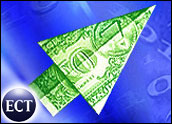
Brick-and-click brokerage firm Charles Schwab (NYSE: SCH) announced Thursday that it was eliminating from 2,750 to 3,400 jobs, or 11 to 13 percent of its workforce, in a bid to reduce operating expenses.
The San Francisco, California-based brokerage house also said Thursday that its earnings for the first quarter ending in March would fall short of analyst expectations.
Morningstar.com analyst Harry Milling told the E-Commerce Times the layoffs were not completely unexpected, because the retail trading market has been declining for several months. Schwab announced last week that February trading activity was down 13 percent from the prior month.
Milling said that “it takes a lot for Schwab to lay off employees,” and that the company has a reputation as a humanitarian employer. The last time Schwab announced massive layoffs, according to Milling, was in 1987.
However, this time around, the company could not escape the market downturn.
“Schwab has a fiduciary responsibility as a publicly held company to shareholders,” Milling said.
Net Impact Unclear
The layoffs will include mandatory staff cuts totaling 2,000 to 2,300 full-time employees and 150 to 200 contract employees during the second quarter. Additionally, the company expects to lose another 600 to 900 employees through voluntary attrition.
Schwab spokesperson John Summerfield told the E-Commerce Times that the company will not know for another six to eight weeks how many of the job cuts would come from online operations.
Built-In Back Door
Terminated employees will receive 60 days paid notice, although Summerfield said that they would probably not be required to work the entire 60 days.
In addition, employees will receive a minimum of one month’s severance pay, stock options, and a cash payment to offset the cost of insurance benefits. The company also plans to fund a scholarship program for terminated employees.
The company will also pay any employees rehired within 18 months of their termination date a $7,500 bonus. Milling said that the potential bonus provides an inducement for employees to return and for Schwab to “quickly ramp back up again” in case of a market upswing.
Lowered Expectations
Schwab also said Thursday that it now expects to report first quarter 2001 operating income of $110 to $120 million, or approximately 8 cents per share, on revenues of approximately $1.2 billion. Analysts had predicted earnings of 11 cents a share.
Schwab added that its board of directors had approved the repurchase of up to 20 million shares of the company’s common stock, either through the open market or through privately negotiated transactions based on prevailing market conditions.
Cutting Costs
In addition to cutting staff, Schwab said it is considering reducing its administrative office space and taking some hardware systems offline.
Although Schwab said it would take a $70 million to $100 million pre-tax charge in the second quarter, it said that beginning in the third quarter, it expects the restructuring to reduce pre-tax operating expenses by $40 to $45 million per quarter.
Milling said that the pre-tax savings of $40 to $45 million a quarter may not be enough if retail trading volume does not increase. He also pointed out that waiting to announce layoffs could hurt the company in the long term.
Schwab said hopes to realize an additional pre-tax savings of about $10 million a quarter, beginning in 2002, due to employee attrition.
Market Downturn
Schwab is not the only brokerage firm affected by the market downturn. Ameritrade and TD Waterhouse have both announced layoffs and cost cutting measures.
Milling said the coming months will be “very difficult” for independent online financial services firms that only offer online trading.
“The more services a company can offer, the better its changes of remaining independent and alive,” Milling said.
He pointed out that E*Trade has been working to increase its offerings by offering banking and mortgage services, and that Schwab was also extending its offerings. ![]()
















































Social Media
See all Social Media